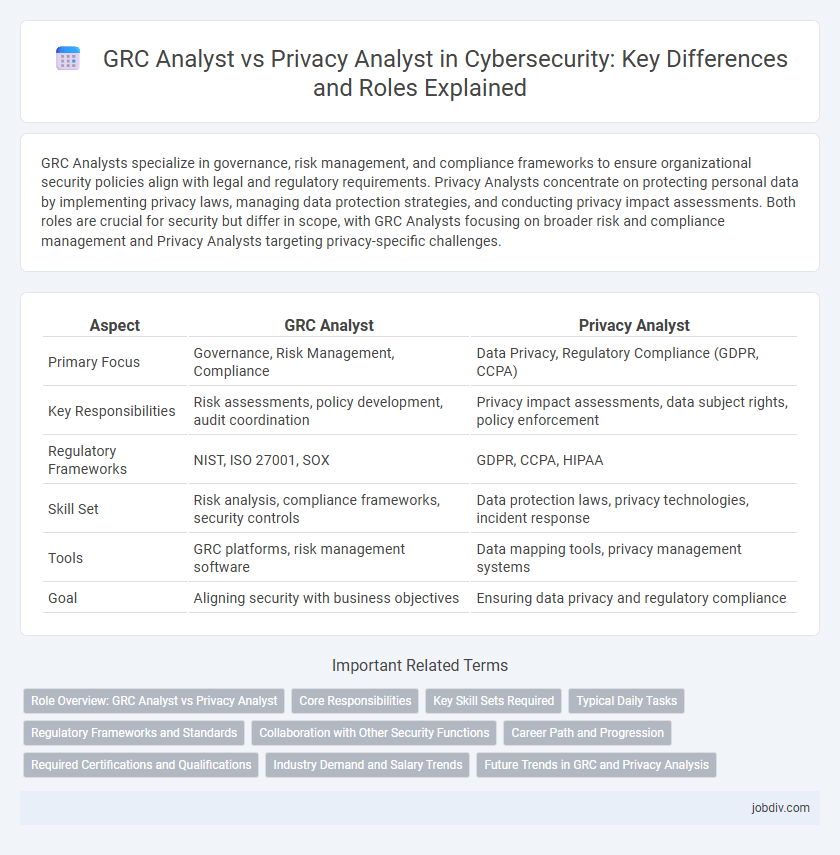GRC Analysts specialize in governance, risk management, and compliance frameworks to ensure organizational security policies align with legal and regulatory requirements. Privacy Analysts concentrate on protecting personal data by implementing privacy laws, managing data protection strategies, and conducting privacy impact assessments. Both roles are crucial for security but differ in scope, with GRC Analysts focusing on broader risk and compliance management and Privacy Analysts targeting privacy-specific challenges.
Table of Comparison
| Aspect | GRC Analyst | Privacy Analyst |
|---|---|---|
| Primary Focus | Governance, Risk Management, Compliance | Data Privacy, Regulatory Compliance (GDPR, CCPA) |
| Key Responsibilities | Risk assessments, policy development, audit coordination | Privacy impact assessments, data subject rights, policy enforcement |
| Regulatory Frameworks | NIST, ISO 27001, SOX | GDPR, CCPA, HIPAA |
| Skill Set | Risk analysis, compliance frameworks, security controls | Data protection laws, privacy technologies, incident response |
| Tools | GRC platforms, risk management software | Data mapping tools, privacy management systems |
| Goal | Aligning security with business objectives | Ensuring data privacy and regulatory compliance |
Role Overview: GRC Analyst vs Privacy Analyst
A GRC Analyst specializes in Governance, Risk, and Compliance by assessing organizational risk, ensuring regulatory compliance, and implementing control frameworks across IT and business operations. A Privacy Analyst focuses on data protection laws such as GDPR and CCPA, managing personal data privacy, conducting privacy impact assessments, and implementing privacy policies. While both roles address regulatory requirements, the GRC Analyst has a broader risk management scope, whereas the Privacy Analyst specifically targets data privacy and compliance.
Core Responsibilities
GRC Analysts are responsible for developing, implementing, and managing governance, risk, and compliance programs to ensure organizational adherence to regulatory requirements and internal policies. Privacy Analysts focus on evaluating, monitoring, and enforcing data privacy practices to protect personally identifiable information (PII) and ensure compliance with privacy laws such as GDPR and CCPA. Both roles require risk assessment and collaboration with legal, IT, and business teams to mitigate security threats and maintain operational integrity.
Key Skill Sets Required
GRC Analysts require expertise in risk assessment, regulatory compliance frameworks such as ISO 27001 and NIST, and proficiency in policy development and audit management. Privacy Analysts must possess in-depth knowledge of data protection laws including GDPR and CCPA, strong capabilities in privacy impact assessments, and skills in managing consent and data subject rights. Both roles demand analytical thinking and effective communication but differ significantly in their regulatory focus and technical competencies.
Typical Daily Tasks
GRC Analysts regularly conduct risk assessments, monitor compliance with regulatory frameworks such as ISO 27001 and NIST, and develop policies to mitigate organizational risks. Privacy Analysts focus on managing data protection strategies, ensuring compliance with privacy laws like GDPR and CCPA, and handling data subject access requests (DSARs). Both roles collaborate on audits, but GRC Analysts emphasize governance and risk mitigation, while Privacy Analysts specialize in safeguarding personal information.
Regulatory Frameworks and Standards
GRC Analysts specialize in implementing and monitoring compliance with regulatory frameworks such as ISO 27001, NIST, and SOX to ensure organizational risk management and governance. Privacy Analysts focus on privacy-specific standards like GDPR, CCPA, and HIPAA, managing data protection and individual privacy rights compliance. Both roles require deep knowledge of relevant laws and standards but differ in scope, with GRC targeting broader governance while Privacy Analysts concentrate on personal data regulations.
Collaboration with Other Security Functions
GRC Analysts collaborate closely with risk management, compliance, and audit teams to develop integrated security policies and ensure regulatory adherence across the organization. Privacy Analysts work alongside data protection officers, legal teams, and IT security to implement privacy frameworks and address data protection issues aligned with GDPR, CCPA, and other privacy laws. Both roles require strong communication and coordination skills to unify security, compliance, and privacy objectives effectively.
Career Path and Progression
GRC Analysts typically progress by gaining expertise in risk management frameworks, regulatory compliance, and internal controls, often moving into roles like Compliance Manager or Risk Director. Privacy Analysts advance through deep specialization in data protection laws such as GDPR and CCPA, with career paths leading to positions like Privacy Officer or Data Protection Manager. Both roles benefit from certifications like CISSP or CIPP, which enhance career opportunities and leadership potential in the security domain.
Required Certifications and Qualifications
GRC Analysts typically require certifications such as Certified in Risk and Information Systems Control (CRISC) or Certified Information Systems Auditor (CISA), emphasizing skills in governance, risk management, and compliance frameworks like ISO 27001 and NIST. Privacy Analysts often hold credentials like Certified Information Privacy Professional (CIPP) or Certified Information Privacy Manager (CIPM), highlighting expertise in data protection laws such as GDPR and CCPA. Both roles benefit from strong analytical skills and understanding of organizational policies, but their certification focus distinctly aligns with risk governance for GRC Analysts and privacy regulations for Privacy Analysts.
Industry Demand and Salary Trends
GRC Analysts and Privacy Analysts both play critical roles in corporate security, with GRC Analysts focusing on governance, risk management, and compliance frameworks, while Privacy Analysts specialize in data protection and privacy regulations such as GDPR and CCPA. Industry demand for GRC Analysts remains strong in finance, healthcare, and technology sectors, reflecting a consistent need for regulatory compliance and risk mitigation, with average salaries ranging from $75,000 to $110,000 annually. Privacy Analysts are experiencing rapid demand growth due to increasing data privacy concerns, often commanding salaries between $80,000 and $120,000, especially in industries handling sensitive customer information like tech and healthcare.
Future Trends in GRC and Privacy Analysis
Emerging trends in GRC analysis emphasize automation, AI-driven risk assessment, and real-time compliance monitoring to enhance decision-making and operational efficiency. Privacy analysts are increasingly focused on integrating advanced data protection technologies such as differential privacy and blockchain to address evolving regulatory landscapes like GDPR and CCPA. Both roles demand expertise in ethical AI, cross-border data governance, and continuous adaptation to cybersecurity threats to future-proof organizational resilience.
GRC Analyst vs Privacy Analyst Infographic

 jobdiv.com
jobdiv.com